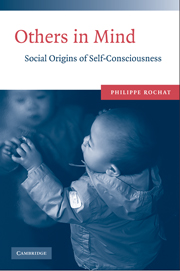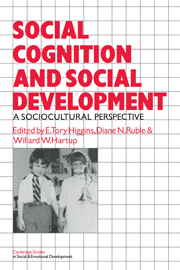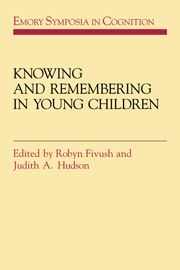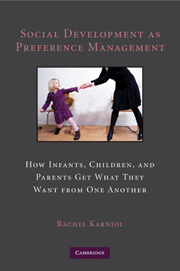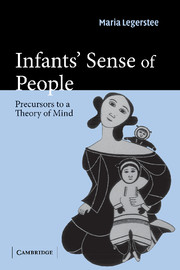Others in Mind
Social Origins of Self-Consciousness
$47.99 (C)
- Author: Philippe Rochat, Emory University, Atlanta
- Date Published: February 2009
- availability: Available
- format: Paperback
- isbn: 9780521729659
$
47.99
(C)
Paperback
Other available formats:
Hardback, eBook
Looking for an examination copy?
This title is not currently available for examination. However, if you are interested in the title for your course we can consider offering an examination copy. To register your interest please contact [email protected] providing details of the course you are teaching.
-
Why are we so prone to guilt and embarrassment? Why do we care so much about how others see us, about our reputation? What are the origins of such afflictions? Philippe Rochat argues that it is because we are members of a species that evolved the unique propensity to reflect upon themselves as an object of thoughts; an object of thoughts that is potentially evaluated by others. But, the argument goes, this propensity comes from a basic fear: the fear of rejection, of being socially "banned" and ostracized. Others in Mind is about self-consciousness, how it originates and how it shapes our lives. Self-consciousness is arguably the most important and revealing of all psychological problems.
Read more- Integrates developmentally informed approaches to provide a new synthesis and theory on the nature and origins of human self- consciousness
- Covers a universal human phenomenon, combined with a unique philosophical argument
- New perspective on the developmental origins of self-concept that combines cognitive, cross-cultural and evolutionary approaches
Reviews & endorsements
“This exceptional book is an inspiration for all clinicians conducting psychotherapy. The nature and development of self consciousness is rarely treated in depth, yet self consciousness is at the core of ‘psychic structure’ and function. Accordingly, it is key in understanding psychopathology. Others in Mind does just that. It explicitly and implicitly provides new perspectives on the processes of treatment and suggests further clinical paths to explore. Bravo! This book was greatly needed.”
—Daniel N. Stern, Cornell University Medical School
See more reviews“An utterly unique voice, passionately combining the scholarly and the personal. A book that first of all engages, but also informs. What could be more interesting than how we learn about ourselves through others?”
—Michael Tomasello, Max Planck Institute for Evolutionary Anthropology, Leipzig, Germany
“Bold in its reach and profound in its implications, this highly original book makes the startling claim that fear of rejection by others drives human self consciousness and an obsessive concern for self. Rochat argues paradoxically that the extended dependency of human infancy on the attentiveness of others for survival and care produces at once a deep need for affiliation and a pervasive terror of rejection. This theme is persuasively worked through for many of the most important concerns of the self in social, cultural, and moral spheres throughout life.”
—Katherine Nelson, CUNY Graduate Center
“So many talk about the self, so few get beyond clichés. This bold book delivers. Bringing together a wealth of research, Rochat forges a comprehensive vision which is truly original. Psychotherapy clinicians, like other readers, will find their grasp of human reality never again the same.”
—George Downing, The Psychiatric Teaching Faculty, Salpetriere Hospital, Paris
"Examines the human propensity for self-consciousness..."
--The Chronicle of Higher Education"...Rochat presents a bold challenge for psychology, one that stresses the importance of group living and the sharing of resources as essential for human survival...[Essential]..."
—S. Krippner, Saybrook Graduate School & Research Center"...thought provoking, learned, and also daring... Others in Mind is an elegantly written essay that will inform, provoke, and inspire thought about the origins of human self-consciousness... It will reward the scholarly reader with new perspectives on a topic of classic and continuing importance."
—Ross A. Thompson, PsycCRITIQUES [March 17, 2010, Vol. 55]Customer reviews
Not yet reviewed
Be the first to review
Review was not posted due to profanity
×Product details
- Date Published: February 2009
- format: Paperback
- isbn: 9780521729659
- length: 264 pages
- dimensions: 231 x 152 x 23 mm
- weight: 0.41kg
- contains: 7 b/w illus.
- availability: Available
Table of Contents
Foreword
Introduction: main ideas
1. Self-conscious species
2. Six propositions
3. Variety of self-reflective mind states
4. Mind states in development
5. Birth of self-consciousness
6. Shame and self-knowledge
7. Roots of guilt
8. Giving and sharing
9. Origins of owning and sharing
10. Social construction of identity
Conclusion: moral space and the self
Post-script note.
Sorry, this resource is locked
Please register or sign in to request access. If you are having problems accessing these resources please email [email protected]
Register Sign in» Proceed
You are now leaving the Cambridge University Press website. Your eBook purchase and download will be completed by our partner www.ebooks.com. Please see the permission section of the www.ebooks.com catalogue page for details of the print & copy limits on our eBooks.
Continue ×Are you sure you want to delete your account?
This cannot be undone.
Thank you for your feedback which will help us improve our service.
If you requested a response, we will make sure to get back to you shortly.
×
